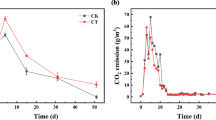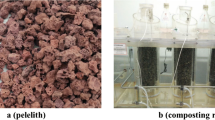Abstract
Microbial shikimic acid is an important intermediate metabolite in the synthesis of aromatic amino acids which are precursors for forming humus during composting process. Generally, the pathways producing shikimic acid and its downstream products are collectively referred as shikimic acid pathway (SKP). Microbial SKP can produce phenols, and tyrosine. Pyrogallol is the precursor of phenols. And, tyrosine can form an ammoniated monomer. Therefore, regulation of SKP can promote shikimic acid production, which is beneficial in promoting humus production and humification. However, SKP present in microbial cells is distinctive because of providing precursors for humification process, which needs to be recognized during composting. Due to the different structures of various organic wastes, it is difficult to control the SKP efficiency and shikimic acid production. Therefore, it is valuable to review the synthesis of shikimic acid by microorganisms and propose how to promote SKP during different materials composting. Furthermore, we have attempted to illustrate the application of metabolites from SKP in forming humus during organic waste composting. Finally, a series of regulating methods has been outlined to enhance microbial SKP, which are effective to promote humus aromatization and to improve humus formation during different materials composting.


Similar content being viewed by others
Data availability
Data will be made available on request.
References
Bai J, Wu Y, Bu Q et al (2022) Comparative study on antibacterial mechanism of shikimic acid and quinic acid against Staphylococcus aureus through transcriptomic and metabolomic approaches. Lwt 153:112441. https://doi.org/10.1016/j.lwt.2021.112441
Bourbiaux D, Pu J, Rataboul F et al (2021) Reductive or oxidative catalytic lignin depolymerization: An overview of recent advances. Catal Today 373:24–37. https://doi.org/10.1016/j.cattod.2021.03.027
Candeias NR, Assoah B, Simeonov SP (2018) Production and synthetic modifications of shikimic acid. Chem Rev 118:10458–10550. https://doi.org/10.1021/acs.chemrev.8b00350
Chen QR, Fan JF, Su J et al (2020) Spatial distribution characteristics of bacterial community structure and gene abundance in sediments of the Bohai Sea. Acta Oceanol Sin 39:69–78
Dale Y, Mackey V, Mushi R et al (2003) Simultaneous measurement of phenylalanine and tyrosine in phenylketonuric plasma and dried blood by high-performance liquid chromatography. J Chromatogr B Analyt Technol Biomed Life Sci 788:1–8. https://doi.org/10.1016/s1570-0232(02)01005-x
del Río JC, Rencoret J, Gutiérrez A et al (2020) Lignin monomers from beyond the canonical monolignol biosynthetic pathway: another brick in the wall. ACS Sus Chem Eng 8(13):4997–5012. https://doi.org/10.1021/acssuschemeng.0c01109
Huang W, Wen P, Wang W et al (2022) Hydrothermal pretreatment improves humification in co-composting of oil palm fronds and paper mill sludge. J Environ Chem Eng 10:107985. https://doi.org/10.1016/j.jece.2022.107985
Jeon JR, Baldrian P, Murugesan K et al (2012) Laccase-catalysed oxidations of naturally occurring phenols: from in vivo biosynthetic pathways to green synthetic applications. Microb Biotechnol 5:318–332. https://doi.org/10.1111/j.1751-7915.2011.00273.x
Jiang Z, Li X, Li M et al (2021) Impacts of red mud on lignin depolymerization and humic substance formation mediated by laccase-producing bacterial community during composting. J Hazard Mater 410:124557. https://doi.org/10.1016/j.jhazmat.2020.124557
Jiao N, Herndl GJ, Hansell DA et al (2010) Microbial production of recalcitrant dissolved organic matter: long-term carbon storage in the global ocean. Nat Rev Microbiol 8:593–599. https://doi.org/10.1038/nrmicro2386
Jokic A, Wang MC, Liu C et al (2004) Integration of the polyphenol and Maillard reactions into a unified abiotic pathway for humification in nature: the role of δ-MnO2. Org Geochem 35:747–762. https://doi.org/10.1016/j.orggeochem.2004.01.021
Kadri T, Rouissi T, Brar SK et al (2017) Biodegradation of polycyclic aromatic hydrocarbons (PAHs) by fungal enzymes: A review. J Environ Sci 51:52–74. https://doi.org/10.1016/j.jes.2016.08.023
Kallenbach CM, Frey SD, Grandy AS (2016) Direct evidence for microbial-derived soil organic matter formation and its ecophysiological controls. Nat Commun 7:1–10. https://doi.org/10.1038/ncomms13630
Kang J, Yin ZL, Pei FY et al (2022) Aerobic composting of chicken manure with penicillin G: Community classification and quorum sensing mediating its contribution to humification. Bioresource Technol 352:127097. https://doi.org/10.1016/j.biortech.2022.127097
Krämer M, Bongaerts J, Bovenberg R et al (2003) Metabolic engineering for microbial production of shikimic acid. Metab Eng 5:277–283. https://doi.org/10.1016/j.ymben.2003.09.001
Lakowicz JR, Cherek H (1980) Dipolar relaxation in proteins on the nanosecond timescale observed by wavelength-resolved phase fluorometry of tryptophan fluorescence. J Biol Chem 255:831–834. https://doi.org/10.1016/S0021-9258(19)86104-5
Li X, Zheng Y (2020) Biotransformation of lignin: Mechanisms, applications and future work. Biotechnol Prog. https://doi.org/10.1002/btpr.2922
Li S, Sun K, Latif A et al (2022) Insights into the applications of extracellular laccase-aided humification in livestock manure composting. Environ Sci Technol 56:7412–7425. https://doi.org/10.1021/acs.est.1c08042
Liu ZH, Le RK, Kosa M et al (2019) Identifying and creating pathways to improve biological lignin valorization. Renew Sust Energy Rev 105:349–362. https://doi.org/10.1016/j.rser.2019.02.009
Liu R, Gao D, Fang Z et al (2022) AroC, a chorismate synthase, is required for the formation of Edwardsiella tarda biofilms. Microbes Infect 24:104955. https://doi.org/10.1016/j.micinf.2022.104955
Maeda H, Dudareva N (2012) The shikimate pathway and aromatic amino acid biosynthesis in plants. Annu Rev Plant Biol 63:73–105. https://doi.org/10.1146/annurev-arplant-042811-105439
Mamoru N, Masamichi T (1979) Deuteration kinetics of tyrosine by means of fluorescence measurement. B Chem Soc JPN 52:1337–1339. https://doi.org/10.1246/bcsj.52.1337
Merkel L, Schauer M, Antranikian G et al (2010) Parallel incorporation of different fluorinated amino acids: on the way to “teflon” proteins. Chem Bio Chem 11:1505–1507. https://doi.org/10.1002/cbic.201000295
Morita T, Jackson CM (1986) Localization of the structural difference between bovine blood coagulation factors X1 and X2 to tyrosine 18 in the activation peptide. J Biol Chem 261:4008–4014
Pline WA, Wilcut JW, Duke SO et al (2002) Tolerance and accumulation of shikimic acid in response to glyphosate applications in glyphosate-resistant and nonglyphosate-resistant cotton (Gossypium hirsutum L.). J Agric Food Chem 50:506–512. https://doi.org/10.1021/jf0110699
Płonka J, Górny A, Kokoszka K et al (2020) Metabolic profiles in the course of the SKP of Raphanus sativus var. longipinnatus exposed to mesotrione and its degradation products. Chemosphere 245:125616. https://doi.org/10.1016/j.chemosphere.2019.125616
Saadat E, Ghorbanzadeh N, Farhangi MB et al (2023) Potential application of Chlorella sp. biomass cultivated in landfill leachate as agricultural fertilizer. Arch Agron Soil Sci 69:1193–1208. https://doi.org/10.1080/03650340.2022.2073351
Santos-Sánchez NF, Salas-Coronado R, Hernández-Carlos B et al (2019) Shikimic acid pathway in biosynthesis of phenolic compounds. Plant Physiological Aspects of Phenolic Compounds 1:1–15
Selvarajan E, Veena R, Manoj Kumar N (2018) Polyphenol oxidase, beyond enzyme browning. Microbial bioprospecting for sustainable development. Springer, Singapore. 203–222. https://link.springer.com/chapter/https://doi.org/10.1007/978-981-13-0053-0_10
Shao S, Wang K, Love JB et al (2022) Water promoted photocatalytic Cβ-O bonds hydrogenolysis in lignin model compounds and lignin biomass conversion to aromatic monomers. Chem Eng J 435:134980. https://doi.org/10.1016/j.cej.2022.134980
Sprenger GA (2007) From scratch to value: engineering Escherichia coli wild type cells to the production of L-phenylalanine and other fine chemicals derived from chorismate. Appl Microbiol Biotechnol 75(4):739–749. https://doi.org/10.1007/s00253-007-0931-y
Starcevic A, Akthar S, Dunlap WC et al (2008) Enzymes of the SKP encoded in the genome of a basal metazoan, Nematostella vectensis, have microbial origins. P Natl Acad Sci USA 105:2533–2537. https://doi.org/10.1073/pnas.0707388105
Stevenson FJ (1994) Humic Chemistry: Genesis, Composition, Reactions. John Wiley and Sons, New York
Su Q, Wu Y, Wang S et al (2023) The reverse function of lignin-degrading enzymes: the polymerization ability to promote the formation of humic substances in domesticated composting. Bioresour Technol 380:129059. https://doi.org/10.1016/j.biortech.2023.129059
Tan KH (2014) Humic Matter in Soil and the Environment: Principles and Controversies, 2nd edn. CRC Press
Tang YF, Dong B, Dai XH (2022) Hyperthermophilic pretreatment composting to produce high quality sludge compost with superior humification degree and nitrogen retention. Chem Eng J 429:132247. https://doi.org/10.1016/j.cej.2021.132247
Tarfeen N, Nisa KU, Hamid B et al (2022) Microbial remediation: A promising tool for reclamation of contaminated sites with special emphasis on heavy metal and pesticide pollution: A review. Processes 10:1358. https://doi.org/10.3390/pr10071358
Wilson DJ, Patton S, Florova G et al (1998) The SKP and polyketide biosynthesis. J Ind Microbiol Biot 20:299–303
Wu J, Zhao Y, Zhao W et al (2017) Effect of precursors combined with bacteria communities on the formation of humic substances during different materials composting. Bioresour Technol 226:191–199. https://doi.org/10.1016/j.biortech.2016.12.031
Wu J, Zhao Y, Yu H et al (2019) Effects of aeration rates on the structural changes in humic substance during co-composting of digestates and chicken manure. Sci Total Environ 658:510–520. https://doi.org/10.1016/j.scitotenv.2018.12.198
Wu J, Yao W, Zhao L et al (2022a) Estimating the synergistic formation of humus by abiotic and biotic pathways during composting. J Clean Prod 363:132470. https://doi.org/10.1016/j.jclepro.2022.132470
Wu SJ, Chen WJ, Lu SJ et al (2022b) Metabolic engineering of shikimic acid biosynthesis pathway for the production of shikimic acid and its branched products in microorganisms: advances and prospects. Mol 27:4779. https://doi.org/10.3390/molecules27154779
Wu Y, Guan CY, Griswold N et al (2020) Zero-valent iron-based technologies for removal of heavy metal (loid)s and organic pollutants from the aquatic environment: Recent advances and perspectives. J Clean Prod 277: 123478. http://dx.doi.org/https://doi.org/10.1016/j.jclepro.2020.123478.
Yang W, Ding H, Puglia D et al (2022) Bio-renewable polymers based on lignin-derived phenol monomers: Synthesis, applications, and perspectives. SusMat 2:535–568. https://doi.org/10.1002/sus2.87
Yao W, Cai D, Huang F et al (2023) Promoting lignin exploitability in compost: a cooperative microbial depolymerization mechanism. Process Saf Environ 174:856–868. https://doi.org/10.1016/j.psep.2023.05.003
Zavarzina AG, Danchenko NN, Demin VV et al (2021) Humic substances: hypotheses and reality (a review). Eurasian Soil Sci 54:1826–1854. https://doi.org/10.1134/s1064229321120164
Zhang W, Zhao Y, Lu Q et al (2022a) Evaluating differences in humic substances formation based on the SKP during different materials composting. Bioresour Technol 364:128060. https://doi.org/10.1016/j.biortech.2022.128060
Zhao L, Wei ZM, Chen XM et al (2021) The remarkable role of SKP in humic acid formation during biochar and montmorillonite addition composting. Bioresour Technol 342:125985. https://doi.org/10.1016/j.biortech.2021.125985
Zhao L, Zhao Y, Zhang WS et al (2022) Identification of key drivers of the microbial shikimic acid pathway during different materials composting. Bioresour Technol 360:12579. https://doi.org/10.1016/j.biortech.2022.127579
Zhong XZ, Li XX, Zeng Y et al (2020) Dynamic change of bacterial community during dairy manure composting process revealed by high-throughput sequencing and advanced bioinformatics tools. Bioresour Technol 306:123091. https://doi.org/10.1016/j.biortech.2020.123091
Zhou HY, Liao XY, Wang TW et al (2010) Enhanced L-phenylalanine biosynthesis by co-expression of pheA(fbr) and aroF(wt). Bioresour Technol 101:4151–4156. https://doi.org/10.1016/j.biortech.2010.01.043
Zhuo C, Wang X, Docampo-Palacios M et al (2022) Developmental changes in lignin composition are driven by both monolignol supply and laccase specificity. Sci Adv. https://doi.org/10.1126/sciadv.abm8145
Acknowledgements
This work is funded by the National Natural Science Foundation of China (No. 51878132), National Key Research and Development Project (No. 2019YFC1906403), National Natural Science Foundation of China (No. 51978131, No. 51778116).
Funding
This work was supported by National Natural Science Foundation of China (Grant numbers 51878132, 51978131 and 51778116), National Key Research and Development Project (Grant numbers 2019YFC1906403).
Author information
Authors and Affiliations
Contributions
All authors contributed to the study conception and design. Zimin Wei is the principal person to complete the manuscript. Yue Zhao put forward many constructive suggestions for the article and gave us a lot of help. Li Zhao and Liqin Wang contributed much for collecting material. Junqiu Wu and Yue Zhao make a great contribution to the logic and the future perspective of the article.
Corresponding author
Ethics declarations
Competing Interests
The authors declare that they have no known competing financial interests or personal relationships that could have appeared to influence the work reported in this paper.
Additional information
Publisher's Note
Springer Nature remains neutral with regard to jurisdictional claims in published maps and institutional affiliations.
Rights and permissions
Springer Nature or its licensor (e.g. a society or other partner) holds exclusive rights to this article under a publishing agreement with the author(s) or other rightsholder(s); author self-archiving of the accepted manuscript version of this article is solely governed by the terms of such publishing agreement and applicable law.
About this article
Cite this article
Wei, Z., Zhao, Y., Zhao, L. et al. The contribution of microbial shikimic acid to humus formation during organic wastes composting: a review. World J Microbiol Biotechnol 39, 240 (2023). https://doi.org/10.1007/s11274-023-03674-5
Received:
Accepted:
Published:
DOI: https://doi.org/10.1007/s11274-023-03674-5




